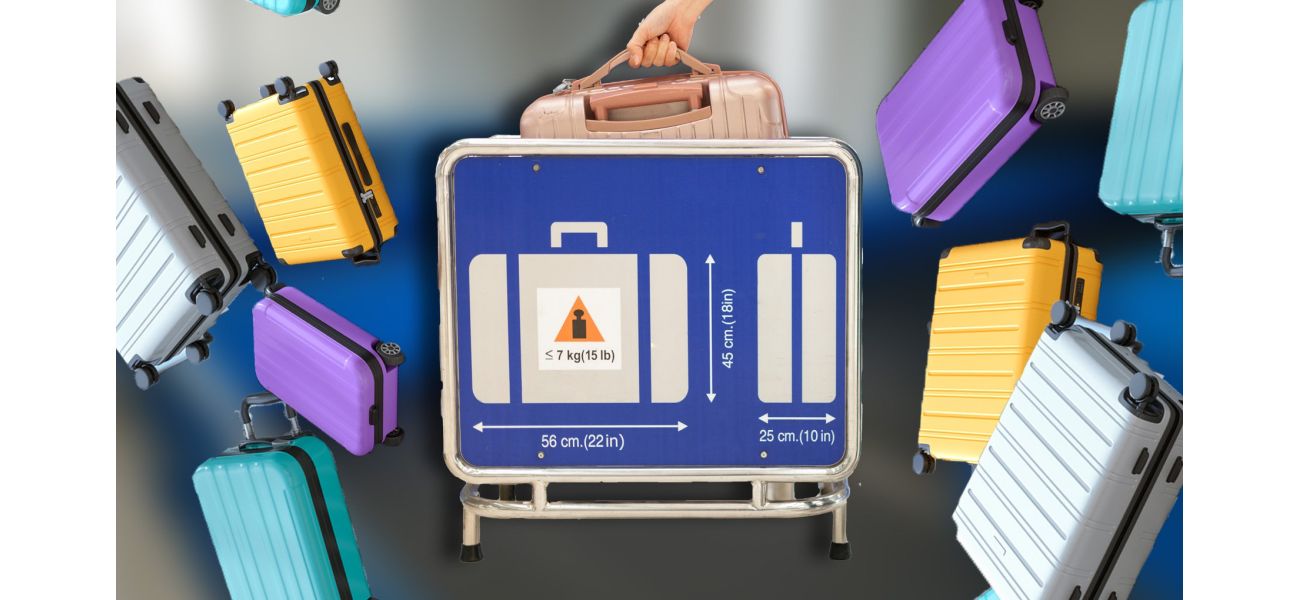Which airline has the top luggage rules? Updated December 2024 policies for EasyJet, BA, and others.
We've compared the baggage limits for top airlines.
December 30th 2024.

When it comes to air travel, baggage allowances can be a major source of frustration for passengers. Many airlines have different rules and hidden costs for bringing on hand luggage and checking bags. In fact, some budget airlines have even faced fines for their "abusive" baggage fees. With constantly changing policies and varying guidelines for different routes and ticket classes, it can be difficult for travelers to keep up. That's why we've taken a closer look at the baggage policies of major airlines flying to and from the UK, to help you understand which one offers the best deal.
First, it's important to know about the three types of luggage that are allowed on flights. A personal item, such as a small bag, must fit under the seat in front of you and is usually no larger than 40x30x20cm. Cabin bags, on the other hand, must be stored in the overhead locker and can typically weigh up to 10kg and be no bigger than 56x45x25cm. Finally, checked bags are larger and must be checked in at the airport, with a maximum weight limit of 23kg.
Many airlines charge additional fees for cabin bags, but there are some that offer a better baggage policy. Air France, Etihad Airways, and Turkish Airlines all allow one free personal item and one free cabin bag, as well as a checked bag weighing up to 23kg, for all fare types and routes. Emirates and Qatar Airways also offer a similar deal, but with a maximum checked bag weight of 20kg. These airlines are considered to have some of the best baggage policies, as they do not require passengers to pay extra for luggage as long as they adhere to the size and weight restrictions.
For budget travelers, Jet2 is a standout option as they allow one piece of carry-on luggage weighing up to 10kg, as long as it is no bigger than 56cm x 45cm x 25cm. This is in addition to a personal item. However, most budget airlines only allow a small bag that fits under the seat for free, and charge for any additional luggage.
It's also important to note the rules for traveling with "smart bags," which have electronic features such as chargers, WiFi, and Bluetooth. British Airways, easyJet, and Ryanair have all banned these types of bags, with varying restrictions. For example, BA will not allow any smart bag in the hold or cabin if the battery cannot be removed. On the other hand, Ryanair and easyJet do not allow the battery to be connected at all, whether in the cabin or hold. It's best to check with your specific airline before traveling with a smart bag, and consider swapping it out for a more traditional one that can fit under the seat.
In terms of what not to pack in your luggage, the list of prohibited items can be extensive and vary by airline. It's important to know the rules for both the cabin and checked baggage, as well as any restrictions for the specific destination you're traveling to. Some common prohibited items include flammable liquids, infectious substances, and explosives. If you're traveling during the holiday season, it's also important to be aware of any festive items that are not allowed on planes.
To make the most of your baggage allowance, travel experts have shared some helpful tips. These include rolling up clothing items to save space, packing multi-use footwear, and wearing layers on the plane to leave more room in your bag. It's also a good idea to research any viral packing hacks before trying them, as they may not be allowed by your airline. By following these tips and staying informed about baggage policies, you can make the most of your luggage allowance and avoid any unwanted fees or restrictions.
First, it's important to know about the three types of luggage that are allowed on flights. A personal item, such as a small bag, must fit under the seat in front of you and is usually no larger than 40x30x20cm. Cabin bags, on the other hand, must be stored in the overhead locker and can typically weigh up to 10kg and be no bigger than 56x45x25cm. Finally, checked bags are larger and must be checked in at the airport, with a maximum weight limit of 23kg.
Many airlines charge additional fees for cabin bags, but there are some that offer a better baggage policy. Air France, Etihad Airways, and Turkish Airlines all allow one free personal item and one free cabin bag, as well as a checked bag weighing up to 23kg, for all fare types and routes. Emirates and Qatar Airways also offer a similar deal, but with a maximum checked bag weight of 20kg. These airlines are considered to have some of the best baggage policies, as they do not require passengers to pay extra for luggage as long as they adhere to the size and weight restrictions.
For budget travelers, Jet2 is a standout option as they allow one piece of carry-on luggage weighing up to 10kg, as long as it is no bigger than 56cm x 45cm x 25cm. This is in addition to a personal item. However, most budget airlines only allow a small bag that fits under the seat for free, and charge for any additional luggage.
It's also important to note the rules for traveling with "smart bags," which have electronic features such as chargers, WiFi, and Bluetooth. British Airways, easyJet, and Ryanair have all banned these types of bags, with varying restrictions. For example, BA will not allow any smart bag in the hold or cabin if the battery cannot be removed. On the other hand, Ryanair and easyJet do not allow the battery to be connected at all, whether in the cabin or hold. It's best to check with your specific airline before traveling with a smart bag, and consider swapping it out for a more traditional one that can fit under the seat.
In terms of what not to pack in your luggage, the list of prohibited items can be extensive and vary by airline. It's important to know the rules for both the cabin and checked baggage, as well as any restrictions for the specific destination you're traveling to. Some common prohibited items include flammable liquids, infectious substances, and explosives. If you're traveling during the holiday season, it's also important to be aware of any festive items that are not allowed on planes.
To make the most of your baggage allowance, travel experts have shared some helpful tips. These include rolling up clothing items to save space, packing multi-use footwear, and wearing layers on the plane to leave more room in your bag. It's also a good idea to research any viral packing hacks before trying them, as they may not be allowed by your airline. By following these tips and staying informed about baggage policies, you can make the most of your luggage allowance and avoid any unwanted fees or restrictions.
[This article has been trending online recently and has been generated with AI. Your feed is customized.]
[Generative AI is experimental.]
0
0
Submit Comment





